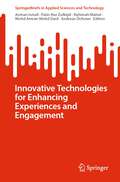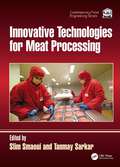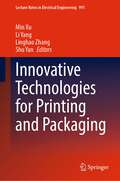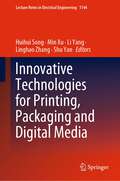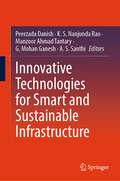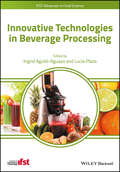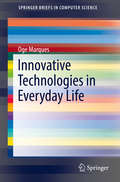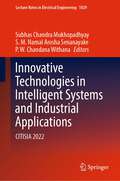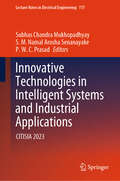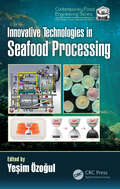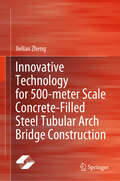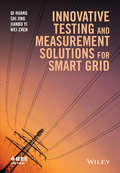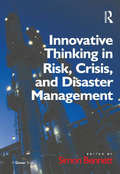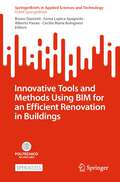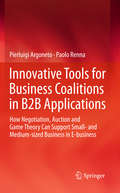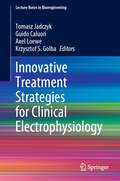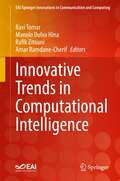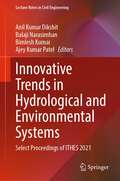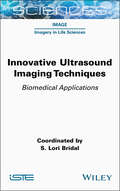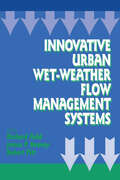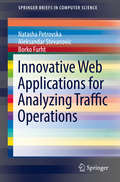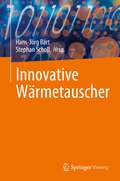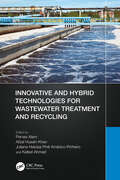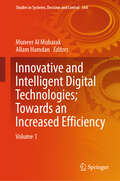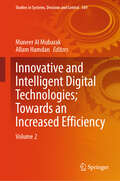- Table View
- List View
Innovative Technologies for Enhancing Experiences and Engagement (SpringerBriefs in Applied Sciences and Technology)
by Andreas Öchsner Azman Ismail Mohd Amran Mohd Daril Fatin Nur Zulkipli Rahimah MahatThe book showcases how the technologies are transforming entertainment, education, and professional training, offering readers real-world examples of their applications. "Innovative Technologies for Enhancing Experiences and Engagement" is an enlightening guide that reveals how emerging technologies are shaping our world, offering insights into the evolving digital landscape and inspiring a future of more personalized, immersive, and engaging experiences.
Innovative Technologies for Meat Processing (Contemporary Food Engineering)
by Tanmay Sarkar Slim SmaouiIn an era where technology plays a pivotal role in shaping various sectors, Innovative Technologies for Meat Processing explores the intersection of innovation and meat processing, offering a comprehensive guide to the latest technological breakthroughs that are transforming the landscape of meat production. This book begins by providing an overview of the traditional methods in meat processing and their limitations and then navigates through emerging technologies from state‑of‑the‑art machinery and automation to the integration of artificial intelligence and data analytics in processing meats. This book caters to a diverse audience, including professionals in the meat processing industry, researchers, policymakers, and anyone interested in the future of food technology.
Innovative Technologies for Printing and Packaging (Lecture Notes in Electrical Engineering #991)
by Min Xu Li Yang Shu Yan Linghao ZhangThis book includes original, peer-reviewed research papers from the 13th China Academic Conference on Printing and Packaging (CACPP 2022), held in Jinan, China, on November 10-12, 2022. The proceedings cover the recent findings in color science and technology, image processing technology, digital media technology, mechanical and electronic engineering and numerical control, materials and detection, digital process management technology in printing and packaging, and other technologies. As such, the book is of interest to university researchers, R&D engineers, and graduate students in the field of graphic arts, packaging, color science, image science, material science, computer science, digital media, network technology, and smart manufacturing technology.
Innovative Technologies for Printing, Packaging and Digital Media (Lecture Notes in Electrical Engineering #1144)
by Min Xu Li Yang Shu Yan Linghao Zhang Huihui SongThis book includes original, peer-reviewed research papers from the 14th China Academic Conference on Printing and Packaging (CACPP 2023), held in Beijing, China on November 24-26, 2023. The proceedings cover the latest findings in color science and technology, image processing technology, digital media technology, mechanical and electronic engineering and numerical control, materials and detection, printing and packaging technology, and so on. As such, the book is of interest to university researchers, R&D engineers and graduate students in the fields of color science, image science, materials science, computer science, digital media, network technology, smart manufacturing technology and printing and packaging.
Innovative Technologies for Smart and Sustainable Infrastructure
by K. S. Nanjunda Rao Peerzada Danish Manzoor Ahmad Tantary G. Mohan Ganesh A. S. SanthiThis book presents front-line advance in the future of infrastructure development, focusing on transforming traditional construction practices. The authors explore a range of innovative methods and materials poised to revolutionize the construction industry, in particular new concrete materials and mix designs with detail on their composition, properties, and applications in construction. The book also discusses utilization of construction and demolition waste materials, demonstrating their potential to mitigate environmental impact while enhancing the sustainability of infrastructure projects. Readers will find particular interest in chapters dedicated to geotextile for sustainable ground improvements and modified bitumen for pavements, providing comprehensive coverage of these advanced techniques and their implications for infrastructure resilience and longevity. Furthermore, the section on utilization of pond ash in concrete and the innovative approach of maximizing electronic waste in concrete production underscore the authors&’ commitment to sustainable material practices. By presenting a diverse array of novel technologies and sustainable practices, this volume equips readers with the knowledge and tools necessary to navigate the evolving landscape of infrastructure development.
Innovative Technologies in Beverage Processing
by Ingrid Aguilo-Aguayo Lucia PlazaAn in-depth look at new and emerging technologies for non-alcoholic beverage manufacturing The non-alcoholic beverage market is the fastest growing segment of the functional food industry worldwide. Consistent with beverage consumption trends generally, the demand among consumers of these products is for high-nutrient drinks made from natural, healthy ingredients, free of synthetic preservatives and artificial flavor and color enhancers. Such drinks require specialized knowledge of exotic ingredients, novel processing techniques, and various functional ingredients. The latest addition to the critically acclaimed IFST Advances in Food Science series this book brings together edited contributions from internationally recognized experts in their fields who offer insights and analysis of the latest developments in non-alcoholic beverage manufacture. Topics covered include juices made from pome fruits, citrus fruits, prunus fruits, vegetables, exotic fruits, berries, juice blends and non-alcoholic beverages, including grain-based beverages, soups and functional beverages. Waste and by-products generated in juice and non-alcoholic beverage sector are also addressed. Offers fresh insight and analysis of the latest developments in non-alcoholic beverage manufacture from leading international experts Covers all product segments of the non-alcoholic beverage market, including juices, vegetable blends, grain-based drinks, and alternative beverages Details novel thermal and non-thermal technologies that ensure high-quality nutrient retention while extending product shelf life Written with the full support of The Institute of Food Science and Technology (IFST), the leading qualifying body for food professionals in Europe Innovative Technologies in Beverage Processing is a valuable reference/working resource for food scientists and engineers working in the non-alcoholic beverage industry, as well as academic researchers in industrial food processing and nutrition.
Innovative Technologies in Everyday Life
by Oge MarquesThis SpringerBrief provides an overview of contemporary innovative technologies and discusses their impact on our daily lives. Written from a technical perspective, and yet using language and terminology accessible to non-experts, it describes the technologies, the key players in each area, the most popular apps and services (and their pros and cons), as well as relevant usage statistics. It is targeted at a broad audience, ranging from young gadget enthusiasts to senior citizens trying to get used to new devices and associated apps. By offering a structured overview of some of the most useful technologies current available, putting them in perspective, and suggesting numerous resources for further exploration, the book gives its readers a clear path for learning new topics through apps and web-based resources, making better choices of apps and websites for frequent use, using social networks effectively, protecting their privacy and staying safe online, and enjoying the opportunities brought about by these technological advances without being completely consumed by them.
Innovative Technologies in Intelligent Systems and Industrial Applications: CITISIA 2022 (Lecture Notes in Electrical Engineering #1029)
by Subhas Chandra Mukhopadhyay S. M. Namal Arosha Senanayake P. W. Chandana WithanaThis book presents the proceedings of the 7th International Conference on Innovative Technologies in Intelligent Systems & Industrial Application (CITISIA), held in virtual mode in Kuala Lumpur, Malaysia, and Sydney, Australia on November 16-18, 2022. It showcases advances and innovations in Industry 4.0, smart society 5.0, mobile technologies, smart manufacturing, smart data fusion, hybrid intelligence, cloud computing, and digital society.
Innovative Technologies in Intelligent Systems and Industrial Applications: CITISIA 2023 (Lecture Notes in Electrical Engineering #117)
by Subhas Chandra Mukhopadhyay S. M. Namal Arosha Senanayake P. W. C. PrasadThis book presents the proceedings of the 8th International Conference on Innovative Technologies in Intelligent Systems & Industrial Application (CITISIA), held in virtual mode in Sydney, Australia and Kuala Lumpur, Malaysia, on November 16-18, 2023. It showcases advances and innovations in Industry 4.0, smart society 5.0, mobile technologies, smart manufacturing, smart data fusion, hybrid intelligence, cloud computing, and digital society.
Innovative Technologies in Seafood Processing (Contemporary Food Engineering)
by Yesim OzogulWhile conventional technologies such as chilling and freezing are used to avoid deteriorative processes like autolytic and microbial spoilage of seafood, innovative technologies have also been developed as a response to economic and environmental demands. Innovative Technologies in Seafood Processing gives information on advances in chilling, freezing, thawing, and packaging of seafood and also updates knowledge of novel process technologies (high-pressure processing, irradiation, ultrasound, pulsed electric field, microwave and radio frequency, sous vide technology, novel thermal sterilization technologies, ozone and nanotechnological applications, and other innovative technologies such as cold plasma, ohmic heating, infrared heating supercritical carbon dioxide, and high-intensity pulsed light) for the seafood industry. Features Reviews novel process technologies applied in the seafood industry Highlights processing effects on product quality and safety of treated seafood Focuses on the development of safe and effective natural antimicrobials and additives Assesses alternative techniques to utilize fish discards and waste as high value products Further it highlights aspects related to quality of seafood treated with these innovative technologies, effect on food constituents, possible risk, security/safety both of seafood and consumers, the environmental impact, and the legislative aspects. The book also addresses the growing international environmental concern for fish discards and fish waste generated in the seafood processing industries by including a chapter, Advances in Discard and By-Products Processing, which assesses alternative techniques to utilize fish discards and waste as high value products. This book will be of value to researchers and technicians in the food technology area, especially those dealing with seafood.
Innovative Technology for 500-meter Scale Concrete-Filled Steel Tubular Arch Bridge Construction
by Jielian ZhengThis present book mainly introduces the latest advancements in design and construction technologies of large-span concrete-filled steel tubular (CFST) arch bridges and steel-reinforced concrete (SRC) arch bridges with a CFST rigid skeleton. The main contents include overall introduction, structural design of the 500-meter scale CFST arch bridges, manufacture and transportation of the steel arch truss segments, design and construction of the buckling system of stayed cables, calculation method and its practice for one-time tensioning of buckle cables, preparation and pouring of the in-tube concrete, design, construction and application of the hoisting system of suspension cables, active force method for displacement control of the hoisting and buckling tower, and the state of the art of the SRC arch bridges. The major innovations of the book are generally summarized from the engineering practices of three recently built super-large-span CFST arch bridges in China, which were guidedby the author and his team. Therefore, the well-organized book is of both high practical and theoretical value. This book is a good reference for bridge design and construction professionals. Also, it serves as a textbook for undergraduate students majoring in civil engineering and graduate students majoring in structural engineering, bridge and tunnel engineering in universities.
Innovative Testing and Measurement Solutions for Smart Grid (Wiley - IEEE)
by Qi Huang Shi Jing Jianbo Yi Wei ZhenFocuses on sensor applications and smart meters in the newly developing interconnected smart grid• Focuses on sensor applications and smart meters in the newly developing interconnected smart grid• Presents the most updated technological developments in the measurement and testing of power systems within the smart grid environment• Reflects the modernization of electric utility power systems with the extensive use of computer, sensor, and data communications technologies, providing benefits to energy consumers and utility companies alike• The leading author heads a group of researchers focusing on the construction of smart grid and smart substation for Sichuan Power Grid, one of the largest in China’s power system
Innovative Thinking in Risk, Crisis, and Disaster Management
by Simon BennettRisk is an enduring theme of modern life. It permeates political, economic and environmental domains. Some risks are unavoidable. Others are not. Innovative Thinking in Risk, Crisis, and Disaster Management provides ideas and action plans for in a risk society. Dealing with issues of civil safety and security, the book addresses the management of socio-technical risks and hazards, environmental risk, and risk perception. Focusing on risk reduction, chapters cover key themes such as terrorism, public order, emergency responding, energy supply, climate change, and natural disasters. Featuring contributions from expert scholars, the book is both accessible and original. Practitioners in the emergency services, industry and commerce will find the book to be valuable reading, whilst for policy makers, students and academics with a focus on risk and crisis management, this is an essential reference.
Innovative Tools and Methods Using BIM for an Efficient Renovation in Buildings (SpringerBriefs in Applied Sciences and Technology)
by Bruno Daniotti Alberto Pavan Sonia Lupica Spagnolo Cecilia Maria BolognesiThis open access book describes a BIM-based toolkit that has been developed according to the latest research activities on building information modelling and semantic interoperability to optimize the building process. It highlights the impacts of using such new tools to fast renovation activities starting from the decision-making and design stages to the construction site management with the possibility to monitor occupants' and owners’ feedback during the realization process. In this process, a framework has been developed and implemented to allow stakeholders involved in a renovation project to efficiently compile, maintain, and add data about (i) building elements, (ii) building services systems, (iii) tenants, operators, and owners of the building, and (iv) current and predicted performance of the building from the various data sources available. The framework applies and specializes the existing practices in the Semantic Web, Linked Data, and ontology domain to the management of renovation projects. It has been designed to be open so that any system which implements the required functions and uses the specified conventions will be able to achieve semantic interoperability with other framework-compliant systems in the renovation domain. Finally, this book represents the validation process of the toolkit that has been held in three demo sites: a social housing building in Italy and two private residential buildings in Poland and Finland. The outcome shows that the toolkit facilitates the renovation process with relevant reductions of time, costs, and energy consumption and that the inhabitants can take advantage of the increase in building performances, quality, and comfort.
Innovative Tools for Business Coalitions in B2B Applications
by Paolo Renna Pierluigi ArgonetoThe manufacturing industry is facing the challenges of shifting its operations from the traditional factory integration philosophy to a supply chain based e-factory philosophy, and of transforming the focus of companies from the local factory to global enterprise and business. Innovative Tools for Business Coalitions in B2B Applications presents a set of innovative methodologies that can be used to face all the issues that stem from the interaction of customers and suppliers in an e-marketplace environment. The first methodology discussed is multi-agent architecture and this forms the basis of a simulation environment developed in order to test the proposed models. The second concerns a bargaining model based on the negotiation mechanism and the third centers on production planning to support agents during the bargaining phase. The fourth is the possibility of a coalition between the suppliers and the authors offer a choice of two different approaches. One is the application of Nash equilibrium to select the members of a potential coalition of sellers, while the other is a centralized approach with a profit sharing mechanism based on the Shapley value. All the innovative approaches reported in Innovative Tools for Business Coalitions in B2B Applications have been statistically tested in different market conditions. The methodologies, approaches and results presented in Innovative Tools for Business Coalitions in B2B Applications will be of interest to PhD students, operations managers and supply chain management researchers who develop value-added services for an e-marketplace in a business-to-business environment.
Innovative Treatment Strategies for Clinical Electrophysiology (Lecture Notes in Bioengineering)
by Tomasz Jadczyk Guido Caluori Axel Loewe Krzysztof S. GolbaThis book highlights the advancements in different fields of clinical electrophysiology and gives the reader a good background of the established practices. To tackle such a wide topic, the book focuses on two main aspects: ablation and pacing, discussing the novel energy sources and approaches to rhythm restoration and control; devices and signal processing, highlighting the new available technologies and numerical approaches aiding practice and home medicine. It also presents the reader with selected strategies that could be a paradigm shifts for the field: in situ cell reprogramming, exploiting the newly founded achievements in epigenetic modification of somatic cells; artificial intelligence; cardiac digital twinning, which aims to collect the information from imaging, mechanics and electrophysiology and condense it into a patient-specific model for personalized treatment.
Innovative Trends in Computational Intelligence (EAI/Springer Innovations in Communication and Computing)
by Rafik Zitouni Ravi Tomar Manolo Dulva Hina Amar Ramdane-CherifThis book addresses the key problems that computational intelligence aims to solve, including (i) the involved computational process might be too complex for mathematical reasoning; (ii) it might contain some uncertainties during the process, or (iii) by nature, the computational process is a randomly determined one (heuristic). The contributors make use of methods that are close to the human's way of reasoning, that is, available information might be inexact or incomplete, yet it would be able to produce controlled actions in an adaptive way. Approaches presented in the book include swarm intelligence, artificial immune systems, image processing, data mining, natural language processing, text mining, and other solutions involving artificial intelligence methodologies.
Innovative Trends in Hydrological and Environmental Systems: Select Proceedings of ITHES 2021 (Lecture Notes in Civil Engineering #234)
by Balaji Narasimhan Anil Kumar Dikshit Bimlesh Kumar Ajey Kumar PatelThis book presents select proceedings of the International Virtual Conference on Trends in Hydrological and Environmental Systems (ITHES 2021). Various topics covered in this book include urban hydrology, hydrological extremes, statistical analysis of hydro-meteorological data, impacts of climate change, hydrological modelling, groundwater studies, water resource management and applications of RS & GIS in hydrology. The book also discusses various topics on applications of CFD in water resources and environmental engineering, water and wastewater treatment, solid waste management and air quality. The book will be a valuable reference for beginners, researchers, and professionals interested in environmental civil engineering, especially hydrological and environmental systems.
Innovative Ultrasound Imaging Techniques: Biomedical Applications (ISTE Invoiced)
by S. Lori BridalThis book provides an understanding of ultrasound imaging principles and how the field is evolving to better probe living systems. Today, widely-used imaging systems visualize structures and blood flow within the body in real-time. Signal analysis, hardware and contrast agent innovations are extending the capacity of ultrasound to assess tissue elasticity, to enable three-dimensional viewing of moving structures and to detect vessels smaller than the wavelength-limited resolution. Techniques are also being designed so that we are less impeded by bones in the sound path, as well as to combine light and sound to detect optically-absorbent structures within the body. After an introductory chapter reviewing the key basic concepts, each chapter presents a detailed explanation focusing on a specific set of key principles and then shows the related techniques in each domain that are currently being refined to evaluate living systems in greater depth.
Innovative Urban Wet-Weather Flow Management Systems
by Richard Field James P. Heaney Robert PittThe 20th century's automobile-inspired land use changes brought about tremendous transformations in how stormwater moves across the modern urban land-scape. Streets and parking areas in the average urban family's neighborhood now exceed the amount of land devoted to living space. Add parking, office and commercial space, and it's easy to understand
Innovative Web Applications for Analyzing Traffic Operations
by Borko Furht Natasha Petrovska Aleksandar StevanovicIn response to the need to improve road traffic operation, researchers implement advanced technologies and integration of systems and data, and develop state-of-the-art applications to assist traffic engineers. This SpringerBrief introduces three novel Web applications which can be an exceptional resource and a good visualization tool for traffic operators, managers, and analysts to monitor the congestion, and analyze incidents and signal performance measures. The applications offer more detailed analysis providing users with insights from different levels and perspectives. The benefit of providing these automated and interactive visualization tools is more efficient estimation of the local transport networks' performance, thus facilitating the decision making process in case of emergency events.
Innovative Wärmetauscher
by Hans-Jörg Bart Stephan SchollDieses leicht verständliche Buch stellt unkonventionelle Technologien für die Konstruktion von Wärmetauschern vor, die in der Lage sind, Lösungen für wichtige Probleme in der Prozess- und Energieerzeugungsindustrie zu bieten. Es zeigt die Vorteile und Grenzen dieser innovativen Wärmetauscher auf, diskutiert Mikro- und Nanostrukturoberflächen und mikroskalige Geräte und stellt Kissenplatten-, Spiral- und Streckmetallumlenkungskonzepte vor. Es bietet Schritt-für-Schritt-Arbeitsbeispiele, die Anleitungen für die Entwicklung einer ersten Konfiguration liefern und durch klare, detaillierte Zeichnungen und Bilder unterstützt werden.Es gibt verschiedene Arten von Wärmetauschern, die in allen Bereichen der Industrie zu Kühl- oder Heizzwecken eingesetzt werden, auch in Verbrennungsmotoren. Der Markt wurde 2012 auf 42,7 Mrd. U$ geschätzt, und die weltweite Nachfrage nach Wärmetauschern verzeichnet ein jährliches Wachstum von etwa 7,8 %. Es wird erwartet, dass der Marktwert im Jahr 2016 57,9 Mrd. U$ erreichen und sich bis 2020 auf 78,16 Mrd. U$ belaufen wird.Als wertvolle Einführung für Studenten und Forscher bietet dieses Buch klare und prägnante Informationen für Wärmetechniker, Maschinenbauingenieure, Verfahrenstechniker und Wärmetauscherspezialisten.
Innovative and Hybrid Technologies for Wastewater Treatment and Recycling
by Pervez Alam Afzal Husain Khan Pinê Américo-Pinheiro, Juliana Heloisa Kafeel AhmadInnovative and Hybrid Technologies for Wastewater Treatment and Recycling investigates the biological and non-biological features of the treatment process for wastewater and emphasizes the benefits that these aspects bring for sustainable engineering. It discusses several approaches that are based on biological and non-biological processes and examines the fundamental principles, practical applications, current achievements, future aspects, and associated limits. Further, it provides a wide range of innovative research on the treatment of wastewater, as well as the applications in the treatment, remediation, and pollution prevention processes. Explains the principles and concepts of the most recent and innovative treatment processes for wastewater remediation. Examines emerging nanofiber technology for the purification of wastewater. Provides an overview of the most cutting-edge environmentally friendly technologies.
Innovative and Intelligent Digital Technologies; Towards an Increased Efficiency: Volume 1 (Studies in Systems, Decision and Control #564)
by Allam Hamdan Muneer Al Mubarak"Innovative and Intelligent Digital Technologies: Towards Increased Efficiency" is a groundbreaking book that explores the transformative power of cutting-edge digital solutions. From artificial intelligence to blockchain, this comprehensive guide reveals how these technologies can reshape businesses, streamline processes, and drive unprecedented growth. Packed with real-world case studies and expert analysis, this book equips you with the knowledge and strategies to stay ahead in today's rapidly evolving digital landscape. Discover the secrets to increased efficiency, improved productivity, and sustainable growth by embracing the future of technology.
Innovative and Intelligent Digital Technologies; Towards an Increased Efficiency: Volume 2 (Studies in Systems, Decision and Control #569)
by Allam Hamdan Muneer Al MubarakThis book delves into how these technologies, including artificial intelligence, machine learning, data analytics, and the Internet of Things, are revolutionizing business operations. Through real-world case studies and expert analysis, the book showcases practical applications of these technologies in sectors like manufacturing, health care, finance, and logistics. It highlights the benefits and challenges of adopting these innovations, offering valuable insights for organizations seeking improved efficiency. The book also addresses ethical considerations and societal implications, including data privacy, security, and the future of work in an increasingly digitized world. It emphasizes the responsible implementation of digital technologies for a sustainable and inclusive future.
